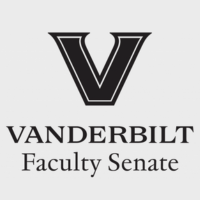Chancellor Daniel Diermeier reflected on Vanderbilt’s strength and promise at the mark of its Sesquicentennial at the Spring Faculty Assembly on April 10, which also included the presentation of the 2023 Spring Faculty Awards.
“After 150 years, Vanderbilt is stronger than it has ever been,” Diermeier said. During his remarks, the chancellor cited the record number of students applying to the university, the combined $1 billion in annual research funding for the university and medical center, and the university’s reputation as one of the nation’s leading research institutions.
“Vanderbilt provides an education for students that is distinct and second to none,” Diermeier said. “Success at this level doesn’t happen by chance. It is the result of a clarity of purpose and strategic direction, nurtured and refined over years. But, most importantly, it is the consequence of the dedicated, daily work of our faculty, where the careful, diligent and thoughtful research and teaching you do every day leads to the transformative education and pathbreaking research, innovation and artistic creation that we celebrate.”
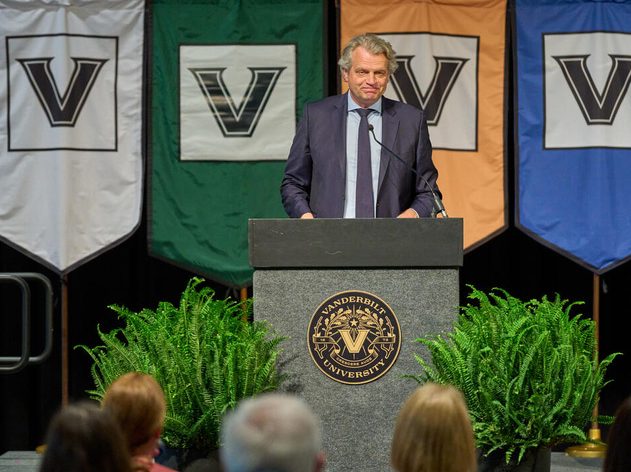
During his remarks at the assembly in the Student Life Center, Diermeier outlined two core values that define Vanderbilt and set it apart: a deep belief in realizing our full potential—intellectually, and as human beings—and the belief that people grow best as members of a community that supports and challenges them.
The chancellor noted that Vanderbilt’s culture leads to real results. He mentioned the work of our Task Force on Administerial Effectiveness as an outstanding example of administration and faculty coming together to identify barriers to research and education, to have candid and not-always-easy conversations and to identify real solutions.
“In the spirit of radical collaboration, we will keep working together to continuously improve,” Diermeier said. “That means doing more to support discovery, creation and innovation.”
FACULTY AWARDS
Diermeier and Faculty Senate Chair Rebecca R. Swan, professor of pediatrics and assistant dean for graduate medical education, presented awards to eight faculty members who have made a significant impact through scholarship, research, creative expression, service, teaching or mentoring.
Bradley Malin, Accenture Professor of Biomedical Informatics, professor of biostatistics and computer science, and founder of the Health Information Privacy Laboratory, received the Alexander Heard Distinguished Service Professor Award. The award recognizes scholarship that contributes to the analysis and solution of significant problems of contemporary society.
Malin’s research is in maximizing the potential of the massive amounts of generated health data by making it available on a broad scale—but doing so without violating the rights of the people to whom the data corresponds—with the goal of constructing technologies that enable privacy and analytics.
He works to develop practical solutions to preserving privacy—with a particular focus on health information—drawing on methods from computer science, biology, policy analysis and economics.
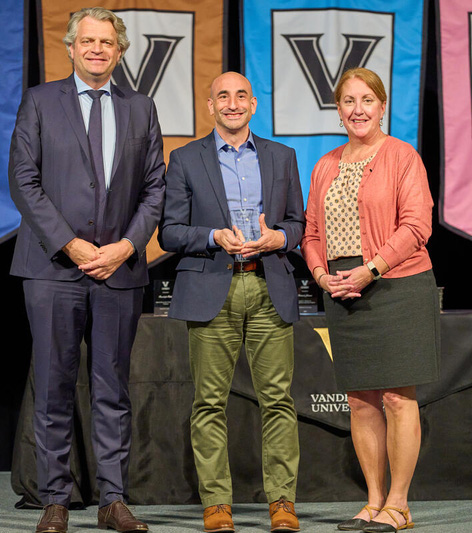
Randolph Blake, Centennial Professor of Psychology and professor of ophthalmology and visual sciences, received the Harvie Branscomb Distinguished Professor Award. This award recognizes faculty accomplishments that further the aims of the university through creative research, teaching and service.
Blake studies human visual perception and the cognitive neuroscience of visual awareness using behavioral, computational and brain imaging techniques to explore areas such as perceptual ambiguity, perception of biological motion, and the ways that knowledge gained through perception and learning guide mental processes that affect one’s grasp of reality.
He has published nearly 300 peer-reviewed articles and is the author of an undergraduate textbook titled Perception, now in its fifth edition. His accomplishments have been recognized with membership in the National Academy of Sciences and the American Academy of Arts and Sciences.
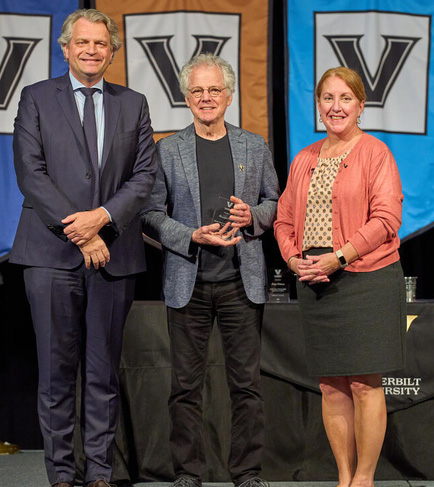
Evelyn Patterson, associate professor of sociology and of law, was this year’s winner of the Joe B. Wyatt Distinguished University Professor Award, which recognizes faculty who develop significant knowledge from research or demonstrate exemplary innovations in teaching.
Patterson’s work in sociology, demography, law and criminal justice investigates social problems and processes. Her current scholarship focuses on a critical examination of race as it relates to maternal mortality, physical and mental health, policing and familial incarceration.
Her multidisciplinary research identifies the real health risks posed by structural inequality and examines the impact on health and psychological well-being of societal burdens faced by marginalized populations—particularly African American families.
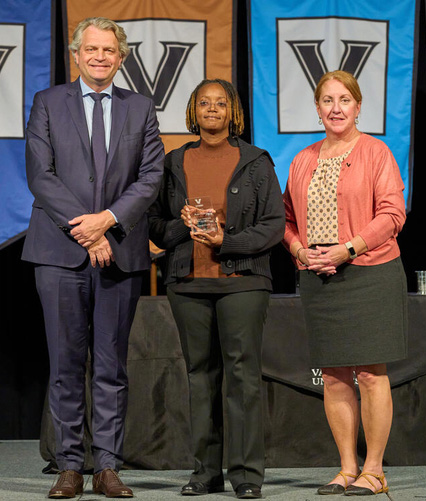
Rolanda Johnson, professor of nursing and associate dean for equity, diversity and inclusion in the School of Nursing won the Joseph A. Johnson, Jr., Distinguished Leadership Professor Award, which recognizes a member of the faculty who has proactively nurtured an academic environment where everyone feels valued and where diversity is celebrated.
Johnson’s experiences in nursing—as a clinician, educator, researcher and administrator—inspired her to make a difference in the lives of those who experience health disparities and inequities and are often overlooked.
As an academic leader, she is passionate about educating nurses to better meet the health care needs of all populations and delivering high-quality, culturally sensitive care to all patients. She has also advocated for holistic admissions at the School of Nursing, which has contributed to more diverse enrollment at the school.
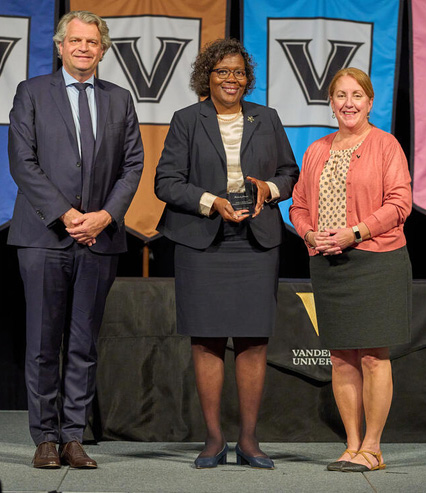
Jeong-Oh Kim, senior lecturer of English, received the Ellen Gregg Ingalls Award for Excellence in Classroom Teaching.
Kim teaches Anglo-American literature for students of diverse nationalities and disciplines while creating a supportive community for his students. He serves as a resource for students in and outside the classroom, providing a sense of confidence and supporting students beyond their time within his course.
The student who nominated him noted, “He created an environment in which … my voice mattered, and I felt like I belonged. … he helped me appreciate the college experience and where I am going in life.”
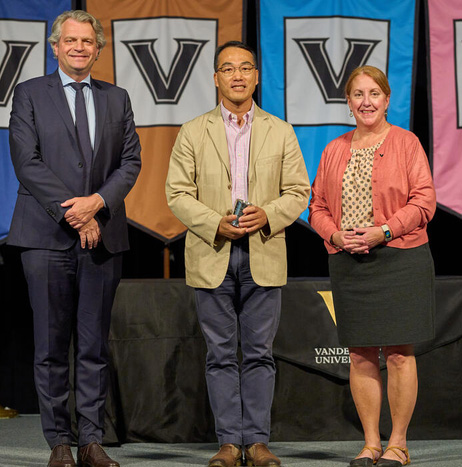
Andrea Capizzi, associate professor of the practice of special education, received the Madison Sarratt Prize for Excellence in Undergraduate Teaching.
Capizzi has more than 25 years of experience teaching, researching and working with students with challenging behaviors from pre-K to middle school. Capizzi shares the knowledge she has gained with the students in her teacher preparation and behavioral methods classes. Students recognized her mastery of the course content and passion for making sure children are set up for social and emotional success.
“I admire so many of her teaching qualities and will absolutely strive to implement them in my own future classroom,” one student nominator said.
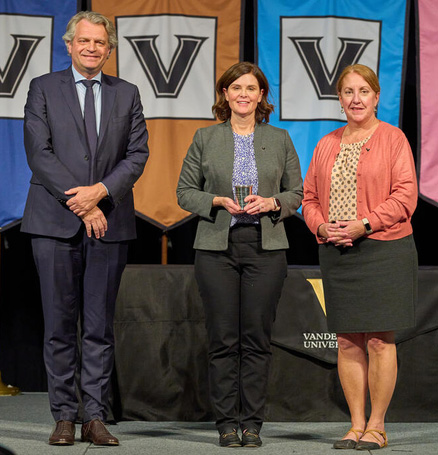
This year, two new awards recognize faculty members’ commitment to mentoring undergraduate students.
The opportunity for undergraduates to participate in research with world-class faculty is a defining experience at Vanderbilt. By engaging in the scientific process, becoming better learners, thinking critically and generating, applying and disseminating knowledge, our students are gaining the tools they will need to make a difference in the world.
Karl Zelik, associate professor of mechanical engineering and of biomedical engineering, received the inaugural Excellence in Undergraduate Research Mentoring Award.
The Zelik lab investigates fundamental mechanisms of legged locomotion and how to improve assistive technologies, such as prosthetic limbs and exoskeletons. Using state-of-the-art equipment, students in the lab perform research on human locomotion using techniques from engineering, biomechanics, bio-signal analysis and neural control.
According to the student nominator, Zelik teaches students in the lab and in his classes how to think about complex problems and communicate ideas, while also providing support and guidance.
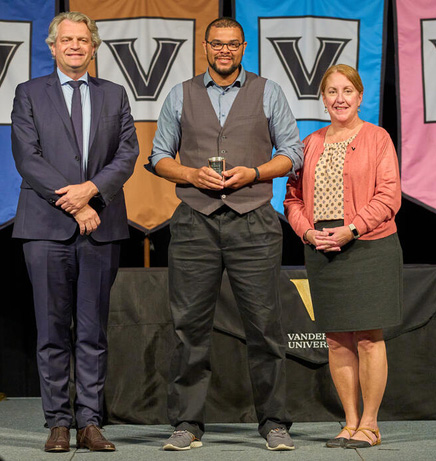
David Hess, James Thornton Fant Professor of Sustainability Studies and professor of sociology, won the first-ever Excellence in Immersion Mentoring Award, which recognizes a faculty member who has been an exceptional Immersion Vanderbilt mentor.
Hess researches the public understanding of science and technology and the politics of the transition to a more sustainable economy and society.
Additionally, Hess helped students complete nine immersion experiences and five culminating immersion projects.
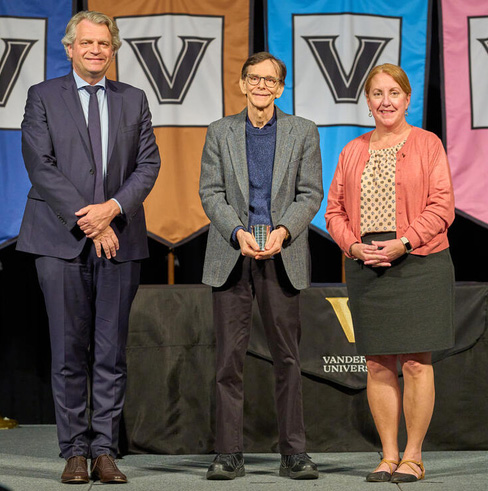
View a list of the previous recipients of all of this spring’s awards on the Faculty Affairs website.
